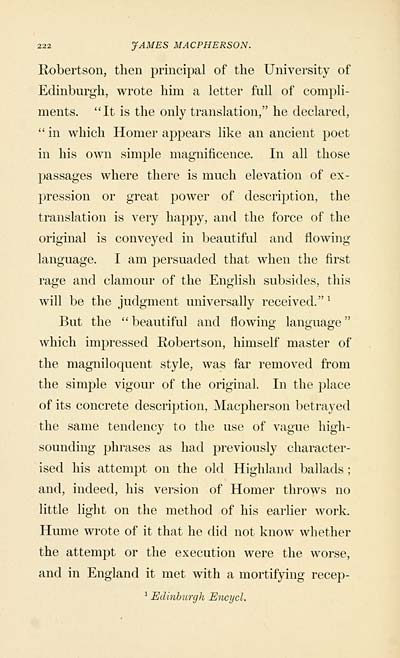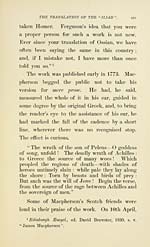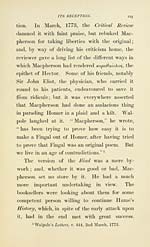Download files
Complete book:
Individual page:
Thumbnail gallery: Grid view | List view

222 JAMES MACPHERSON.
Robertson, then principal of the University of
Edinburgh, wrote him a letter full of compli-
ments. "It is the only translation," he declared,
" in which Homer appears like an ancient poet
in his own simple magnificence. In all those
passages where there is much elevation of ex-
pression or great power of description, the
translation is very happy, and the force of the
original is conveyed in beautiful and flowing
language. I am persuaded that when the first
rage and clamour of the English subsides, this
will be the judgment universally received."^
But the " beautiful and flowing language "
which impressed Robertson, himself master of
the magniloquent style, was far removed from
the simple vigour of the original. In the place
of its concrete description, Macpherson betrayed
the same tendency to the use of vague high-
sounding phrases as had previously character-
ised his attempt on the old Highland ballads ;
and, indeed, his version of Homer throws no
little light on the method of his earher work.
Hume wrote of it that he did not know whether
the attempt or the execution were the worse,
and in England it met with a mortifying recep-
^ Edinburgh Encijcl.
Robertson, then principal of the University of
Edinburgh, wrote him a letter full of compli-
ments. "It is the only translation," he declared,
" in which Homer appears like an ancient poet
in his own simple magnificence. In all those
passages where there is much elevation of ex-
pression or great power of description, the
translation is very happy, and the force of the
original is conveyed in beautiful and flowing
language. I am persuaded that when the first
rage and clamour of the English subsides, this
will be the judgment universally received."^
But the " beautiful and flowing language "
which impressed Robertson, himself master of
the magniloquent style, was far removed from
the simple vigour of the original. In the place
of its concrete description, Macpherson betrayed
the same tendency to the use of vague high-
sounding phrases as had previously character-
ised his attempt on the old Highland ballads ;
and, indeed, his version of Homer throws no
little light on the method of his earher work.
Hume wrote of it that he did not know whether
the attempt or the execution were the worse,
and in England it met with a mortifying recep-
^ Edinburgh Encijcl.
Set display mode to: Large image | Transcription
Images and transcriptions on this page, including medium image downloads, may be used under the Creative Commons Attribution 4.0 International Licence unless otherwise stated. ![]()
| Early Gaelic Book Collections > Ossian Collection > Life and letters of James Macpherson > (240) |
|---|
| Permanent URL | https://digital.nls.uk/80361615 |
|---|
| Description | Selected books from the Ossian Collection of 327 volumes, originally assembled by J. Norman Methven of Perth. Different editions and translations of James MacPherson's epic poem 'Ossian', some with a map of the 'Kingdom of Connor'. Also secondary material relating to Ossianic poetry and the Ossian controversy. |
|---|
| Description | Selected items from five 'Special and Named Printed Collections'. Includes books in Gaelic and other Celtic languages, works about the Gaels, their languages, literature, culture and history. |
|---|

